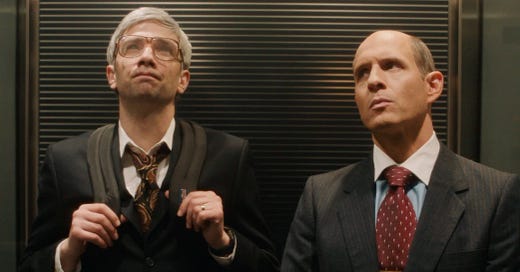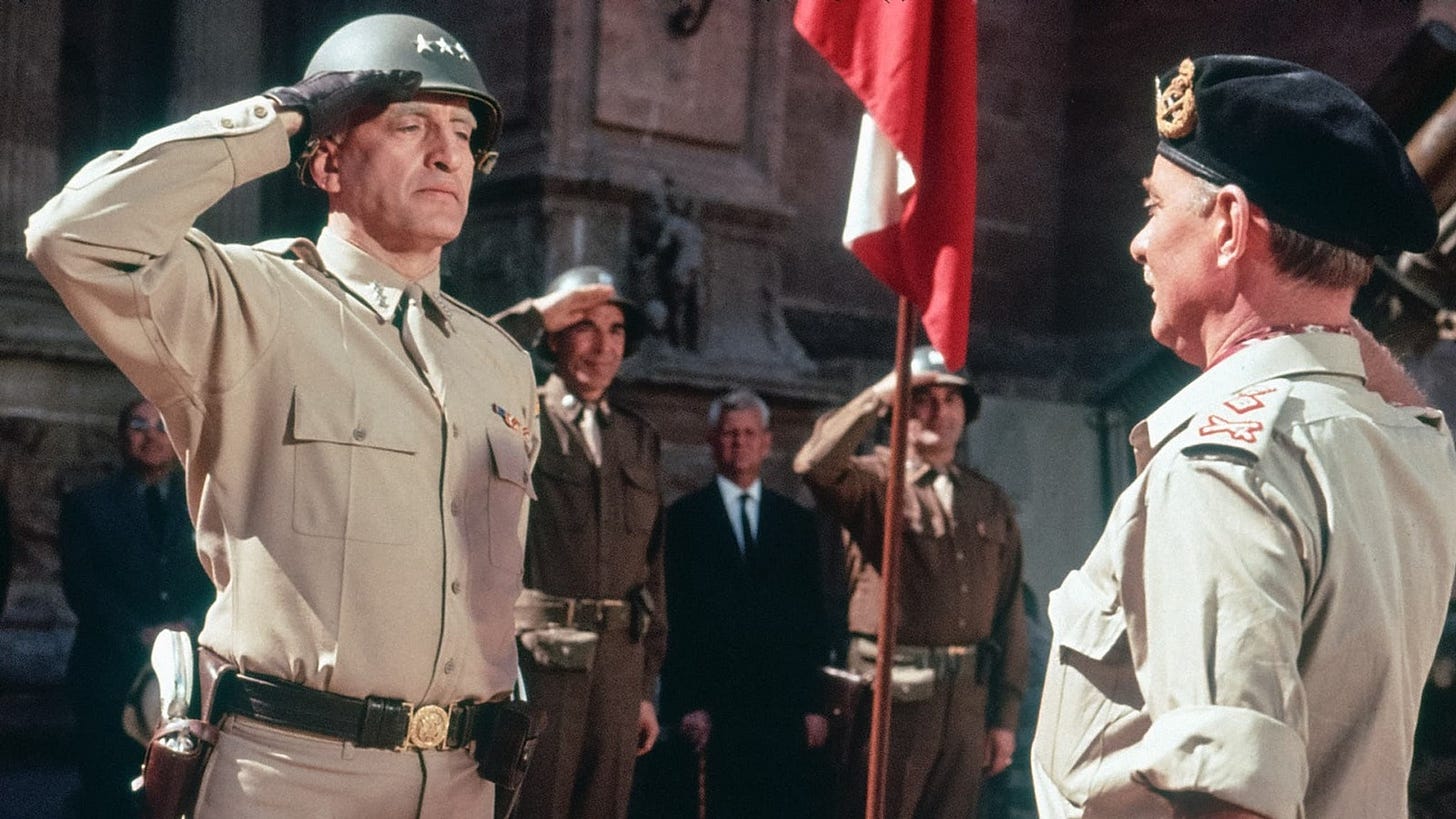Weekly Watches: March 6, 2024
Sharing Our Recent Discoveries: Weekly Watches with 100 Movies Every Catholic Should See
Introducing "Weekly Watches," our exciting new series here at 100 Movies Every Catholic Should See! As passionate movie enthusiasts, the thrill of discovering hidden gems and cinematic treasures is what fuels our love for film. While our team frequently uses apps like Letterboxd to review and analyze movies, we wanted to extend the joy of our discoveries directly to you, our audience. Each week, we'll be sharing our latest cinematic finds, offering insights, recommendations, and reflections on an array of films that have captured our attention. Join us on this journey as each of our writers shares their thoughts on a film they've chosen to spotlight!
Blackberry (2023)
Directed by Matt Johnson, Starring Jay Baruchel, Glenn Howerton
By
In a year with a surprising amount of corporate biopics (Air, Flamin’ Hot) only one from 2023 has stood out as a bona fide great film. Blackberry, directed by Matt Johnson, is unlike those other films, which each celebrate the certain success of a certain product and the certain people responsible. Anyone remotely familiar with the Blackberry (that hot new phone your dad had for a time around 2005) knows that this is not a story that ends well, and this film utilizes that anti-catharsis to maximum comedic potential.
I didn’t even know they made films this genuinely sincere, pithy and hilarious anymore! The combined leading trio of Jay Baruchel, Glenn Howerton, and Matt Johnson (he acts too!) all are perfect in their roles playing the real people who were responsible for the entire debacle, and every other supporting actor (including Cary Elwes in a memorable cameo) shines so bright. It’s an oft-repeated aphorism in Hollywood that your movie is only as good as its smallest role, and the amount of scenery-chewing done by the ensemble is glorious. This may be the closest thing we’ll have to another Dr. Strangelove in a long time.
Definitely recommend, check it out on Hulu!
Tenet (2020)
Directed by Christopher Nolan, Starring John David Washington
By
There is a criminally underrated movie from Christopher Nolan that too many people have been sleeping on, dismissing, or simply not giving a chance to. Hard to believe? I don’t disagree with you, especially when his latest, Oppenheimer, continues its march towards an Oscars sweep this weekend, bringing Nolan — perhaps the most powerful director in Hollywood — his much-deserved first little golden statue. And yet, his previous film, Tenet, has been lost in the shuffle. Its release in the middle of 2020, as the movie to “bring people back to theaters,” can help explain that, along with the reviews that were a touch less enthusiastic than Nolan typically receives (critics frequently called out the film for coming out in the middle of a pandemic, rather than focusing more on what the movie actually had to offer.)
No matter the reason why, Tenet finally was given its chance in the sun this past month with a full rerelease on IMAX screens. I’ll admit, Tenet baffled me on my first watch, with its almost deliberately obtuse nature. And yet, despite my initial misgivings, I kept being pulled to return to Nolan’s “twilight world,” discovering a new revelation each time. Nolan refuses to hold your hand on this one and expects you to do the work and keep up. It’s well worth it to do so. Come for Tenet’s labyrinthine plotting, gorgeous visuals, and amazing set pieces. Stay for its starkly original blockbuster offerings in a landscape filled with sameness.
(Stay tuned for a deeper dive on Nolan’s Tenet at a later date!)
Patton (1970)
Directed by Franklin J. Schaffner, Starring George C. Scott
By
The 1960s and 1970s saw a proliferation of military films set in the Second World War. Though many have certainly become revered classics, Patton stands as one of the best I’ve seen. Part of what makes this biopic so effective is that it resists common temptations of the genre to become waylaid in the various side characters and episodes of the tantalizingly vast canvas against which it was set. To me, the film hearkens back to the epics of old, where the actions of one great man overshadowed an entire conflict. George C. Scott’s performance singularly brings Patton’s maverick and polarizing character to life, delivering an entertaining slew of spicy one-liners that have had me chuckling for days after.
It’s particularly interesting to consider this film in the context of the age it was made as America was in the thick of its embroilment in Vietnam. I think one can see Patton as a yearning for simpler times, where the lines of good and evil were clearly delineated in conflict. There’s a constant struggle between simple acts of bravery and tactical acumen on the battlefield and the invisible bureaucratic hands pulling the strings from afar. The drama plays out against a vast ensemble of beautiful European landscapes with thousands of extras, all shot on glorious 70 mm film.
Patton has something for everyone, from thrilling desert tank battles, to an intimate look at the struggles, hopes and aspirations of one great, if flawed, man. Do yourself a favor and give it a watch to not only learn more about one of military history’s most fascinating characters but also to enjoy some truly great filmmaking.
Three Early Hitchcock Thrillers: Sabotage (1936), The Lady Vanishes (1938), The 39 Steps (1935)
Directed by Alfred Hitchcock
By
I've recently been watching through Alfred Hitchcock's early filmography, and although many are boring or hard to watch, I've seen some genuinely great thrillers. Three in particular I'd recommend: first, Sabotage (1936), which follows the story of Mrs. Verloc, an Englishwoman who gradually discovers she is married to a saboteur planting bombs around London. Oscar Homolka's performance as Mr. Verloc is particularly noteworthy, with a face tailormade for Hitchcock's gorgeous black and white cinematography. Secondly, The Lady Vanishes (1938), in which a young traveler, Iris, strikes up an acquaintance with an elderly lady on a train; a lady who, indeed, vanishes. Iris, along with a full cast of colorful characters, must find this mysterious lady before it's too late. Finally, perhaps Hitchcock's finest pre-Hollywood thriller is The 39 Steps (1935). In a plotline Hitchcock would return to several times, most notably in North by Northwest, an innocent man, Richard Hannay, gets caught up in an espionage plot and is hunted by the law for murder. A wild chase ensues across England and Scotland, with tense moments influencing some of the best 20th century thrillers (including The Fugitive, a personal favorite), sharp and witty writing and acting, and excellent cinematography. If you're looking for an introduction to Hitchcock's pre-Hollywood work, these three thrillers are an excellent place to start.
The Act of Killing (2012)
Directed by Joshua Oppenheimer
By
The Act of Killing is a documentary that transcends its own medium. After hearing about it consistently from Herzog's Masterclass, I decided it was time to see what it was all about, and curious to see how it differs from Shoah, the titanic Holocaust documentary. The Act of Killing separates itself from any other piece of art in the medium, and is something that needs to be seen by all.
It is difficult to describe this documentary to people, especially without making it sound like exploitation. Within 5 minutes of starting this chilling tale, it is evident that Oppenheimer is out to do something more than just let people live comfortably with their self justified acts of horror. The very nature of this documentary is more in line with the traditional definition of "Apocalypse", which literally means to bring into the light. Oppenheimer wishes to passively convince the subjects of his film that while hailed as heroes and never been prosecuted, they are guilty of some of the worst crimes of humanity a human can commit against his fellow man. Some listen some do not, and some do not care.
But what is important is that he tried to reach out to the lowest of scum, and attempted to give them that chance to redeem themselves. A chance to truly repent, to publicly confess, a chance to become human again. While only partially successful, it is feat and personal journey that has almost never been attempted, and I'm not sure it will ever be replicated. Oppenheimer allows his subjects to exist in a vacuum with themselves, and remains neutral until one comment towards the end, giving his main character a much needed push into the light.
In a time where it is becoming more common to label groups of people as not human, enemies of the state, fascists, insurrectionists etc, it is more important than ever to remember how dangers it is to remove the human aspect from politics, and The Act of Killing serves as a sobering and essential reminder of while we may have difference in opinion as to how to govern ourselves, it is always essential to remember to recognize each other's humanity, and to shy away from those who wish to totally dehumanize those who do not agree.
















Excited for this new series! More “100 Movies” content is always welcome in my feed. 👍
Lady Vanishes and 39 Steps are my two favorite Hitchcock movies! This just reminded me that I need to watch them again. Thank you for launching this new series!